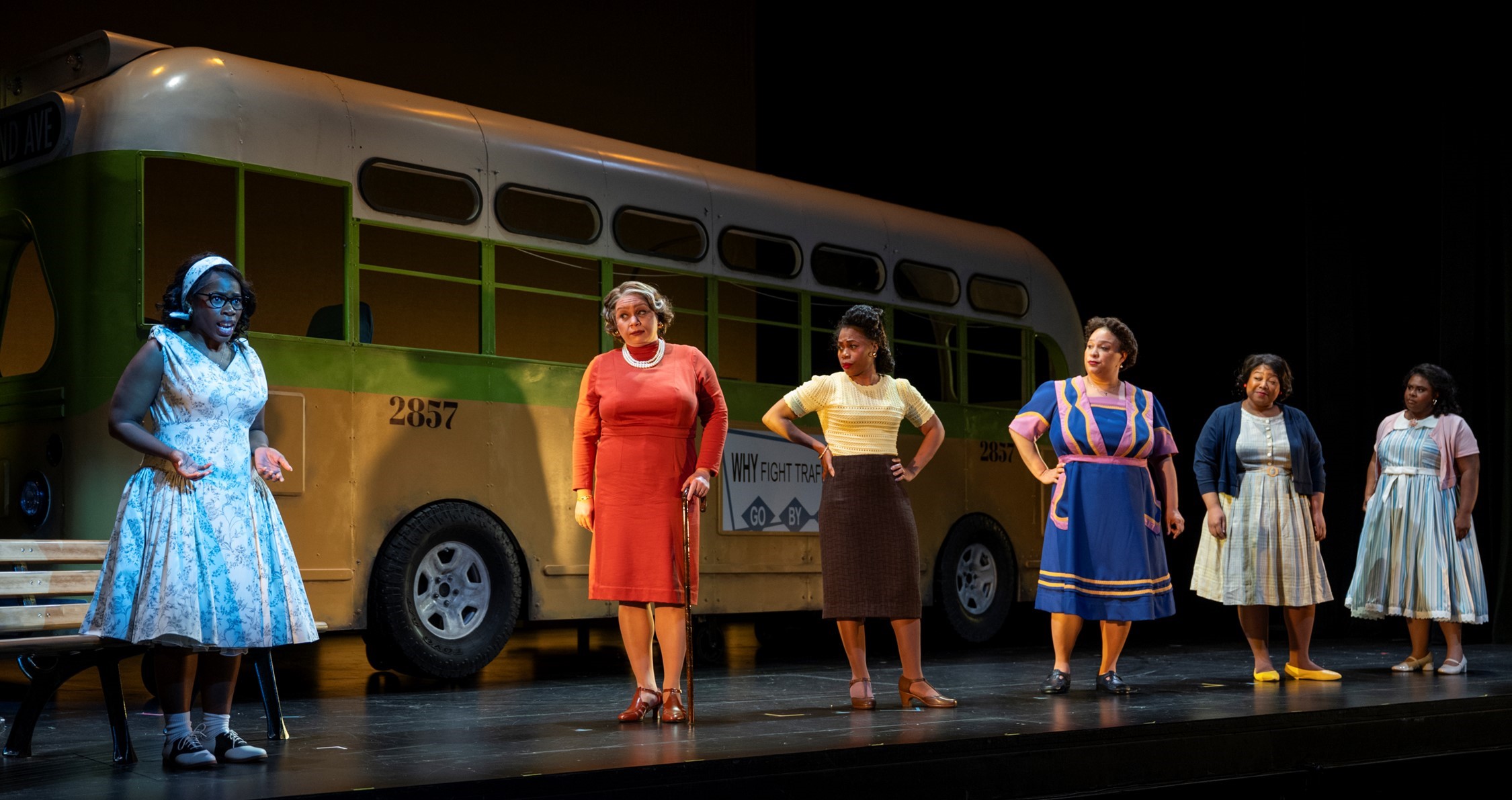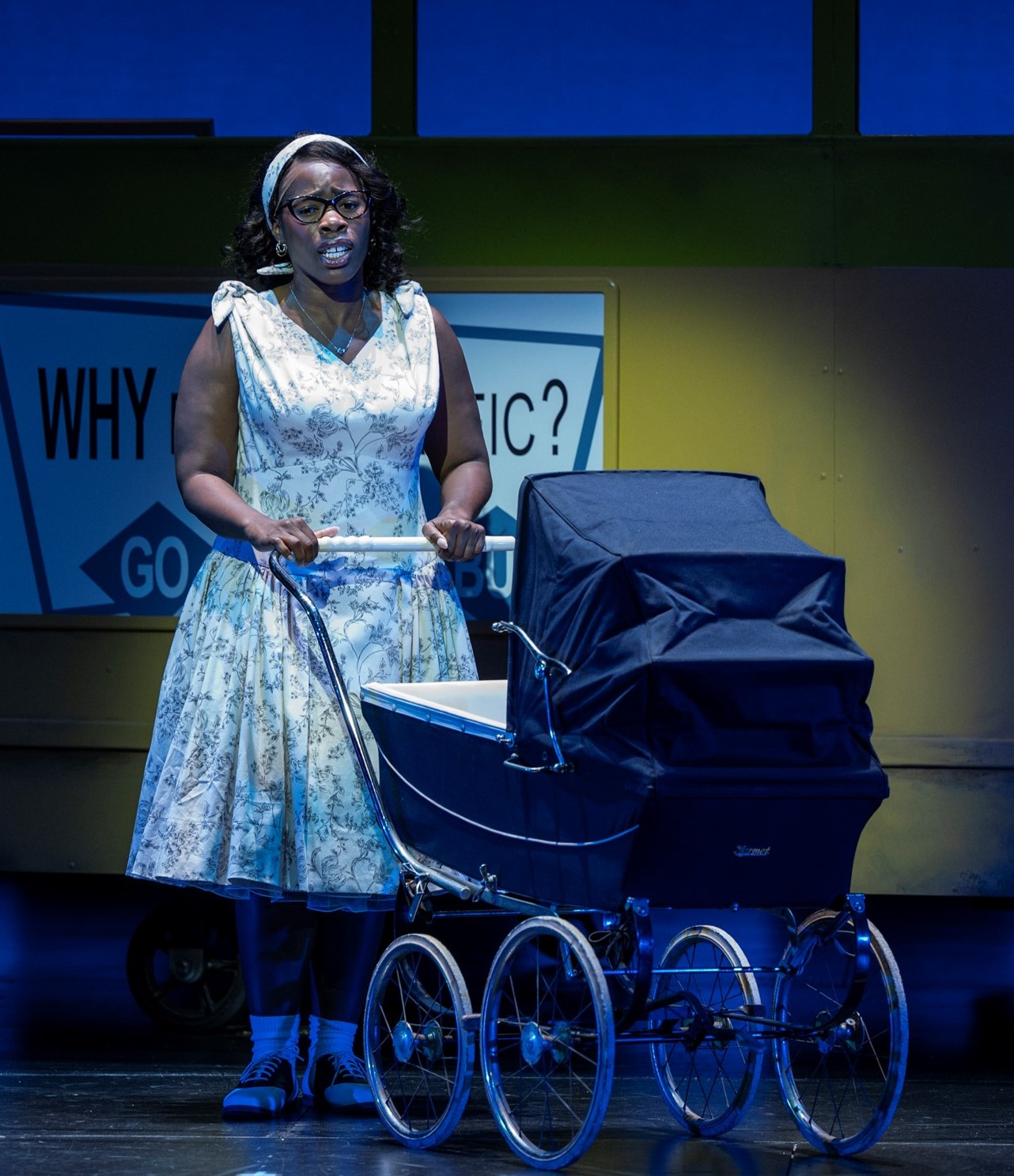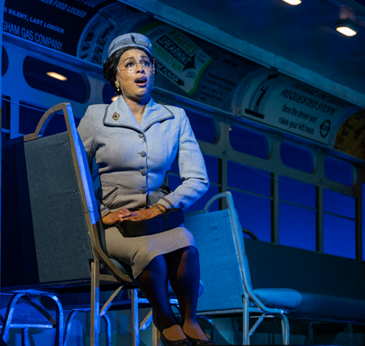Reviews
She Who Dared: New Opera's Tale of Female Courage
CHICAGO—The inaugural performance of She Who Dared Tuesday night, a powerful new opera by composer Jasmine Arielle Barnes and librettist Deborah D.E.E.P. Mouton, was not your usual world premiere.

The cast of Chicago Opera Theater's new opera, She Who Dared
Yes, the production fit the requirements of “first” and “historic.” The opera’s focus is American history, specifically the women, mostly forgotten except for Rosa Parks, who ignited the successful boycott of Montgomery, AL, buses in 1995-56. Barnes and Mouton—both in the midst of distinguished careers—are the first Black women to create a professionally staged opera, according to Chicago Opera Theater (COT). Six Black women, a few also taking male roles, made up the powerhouse cast. This staging grew out of a connection with New York City’s American Lyric Theater, which helps composers and librettists develop new work. Lawrence Edelson, COT artistic and general director since 2023, holds the same position at the American Lyric Theater, which he founded in 2005.
But the portrait of women who refused, months before Rosa Parks, to give up their seats to white bus riders took on added resonance Tuesday night. Edelson’s opening night remarks at Chicago’s Studebaker Theater included the customary thank yous to the production’s donors. Among them was the now embattled National Endowment for the Arts, which provided a $30,000 grant.
“We have a grant from the NEA. It was cancelled,” he said, pausing for dramatic effect. “But we already have the money, and we’re not giving it back!” And all at once, amid raucous applause, the opera’s theme of struggle against powerful forces became more personal. It was a perfect setup for the tale of women whose refusal to step aside for white bus riders helped spark the nationwide civil rights movement.
Barnes’s score for She Who Dared is a mercurial mix of styles, veering from clap-your-hands, raise-the-roof gospel to soulful meditations. Gossipy chitchat among the ladies verges on Gilbert and Sullivan patter. In introspective solos the singers break into impassioned coloratura flights worthy of Donizetti. None of this felt disjointed, even though scenes bounce constantly between 1955 and 1956. Barnes’s orchestration is inventive and full of color, whether letting rip with honky-tonk syncopations or evoking the terror of KKK night riders with low, growling strings. Under the attentive baton of Michael Ellis Ingram, every musical shift seemed to grow organically from the emotional atmosphere onstage. The small orchestra, mainly members of Chicago’s young D-Composed chamber ensemble, was an empathic partner in the action.

With additional performances scheduled June 6 and 8, the opera’s running time is just under three hours including intermission. Director Timothy Douglas and scenic designer Junghyun Georgia Lee have set the story in a single, open-sided vintage bus. Two mechanics turn it at each time-frame shift. Complete with drab seats and 1950s advertising posters, the bus becomes a conference room as the boycott takes shape and a courtroom for the women’s various trials.
The plot line of She Who Dared is an intergenerational struggle between older women cautiously honing their boycott tactics and teen-age girls burning to change the world now. COT’s virtuoso cast gave each a distinctive profile, aided by costume designer Yvonne L. Miranda’s eye for 1950s fashion. Parks, sung by the eloquent lyric soprano Jacqueline Echols McCarley, was a vision of dignified respectability in a pencil-skirted, light wool suit. Susie McDonald—a prosperous, 70-something matriarch who cannily passes for white—sported pearls, a cane, and a chic sheath dress. Mezzo Leah Dexter brought zesty sting to her “Mama Sue” pronouncements.
Fifteen-year-old Claudette Colvin—a pregnant teen involved with an older white man who abandons her—was the first Montgomery Black refusing to surrender her bus seat to a white rider. Jasmine Habersham’s clarion soprano perfectly captured the girl’s fiery impatience for righteous battle. But Mouton also gives Claudette a touching aria; scaling back her agile soprano, Habersham sang it with a ruefully soft edge.
After Parks was arrested in December 1955, her case went to state and local courts. When the boycotters decided to take a cast to federal court, they chose another defendant, Aurelia Browder. A civically active mother of six, she had been arrested in April 1955. Mezzo Chrystal E. Williams’s Browder was a generally no-nonsense presence. But during a contemplative solo, as she worried about endangering her children, we felt the heavy toll of the road she was taking.
Mezzo Deborah Nansteel sang two roles, Jo Ann Robinson, the women’s level-headed chief organizer, and Fred Gray, the boycotters’ young lawyer. At times, her big sound rattled the rafters. At others she scaled back to the voice of sweet but steely spined reason.
 Also singing two roles, soprano Lindsey Reynolds was sprightly as Claudette’s classmate and quietly determined as boycotter Mary Louise Smith.
Also singing two roles, soprano Lindsey Reynolds was sprightly as Claudette’s classmate and quietly determined as boycotter Mary Louise Smith.
Mouton is also a poet, and She Who Dared glistens with vivid imagery. “One degree can turn a ship,” Parks muses. “Can I be that one degree?” An invented character, Jeanetta Reese, a timid housekeeper sung by mezzo Cierra Byrd, can’t find the courage to join the boycotters. “Some of us were happy in the shadows,” she sang, her voice full of anguish and regret.
Douglas keeps the action flowing briskly, but the second act opens with a truly brilliant touch. As Parks settled into the bus stop bench, we assumed she was waiting for her fateful bus ride. But then the orchestra exploded into clamorous celebration, and McCarley, wearing her demure suit, strutted and shimmied across the stage. Her compatriots clapped, singing her praises. Rosa Parks is famous, woman of the hour! Waving and prancing, McCarley beamed with the delight of a beauty pageant winner—Rosa Parks, Miss Montgomery of 1956!
COT’s program book included a detailed essay about the boycott and profiles of each real-life character. But a quick synopsis of the stage action would have been helpful, especially in the first act as we tried to keep track of who was who. In a few of the opera’s slower choruses, the close vocal harmonies were blurry. The libretto didn’t really explain why Claudette let go of her disappointment to reconcile with the older women.
But overall, She Who Dared is a stirring work, and its characters have lingered in my mind. Ordinary women risking personal danger to do extraordinary work that needs to be done. Daring, indeed.
Middle photo: Jasmine Habersham as Claudette Colvin, the pregnant teen on the ride
Bottom: Jacqueline Echols McCarley as Rosa Parks
Photos by Michael Brosilow





 FEATURED JOBS
FEATURED JOBS

 RENT A PHOTO
RENT A PHOTO


